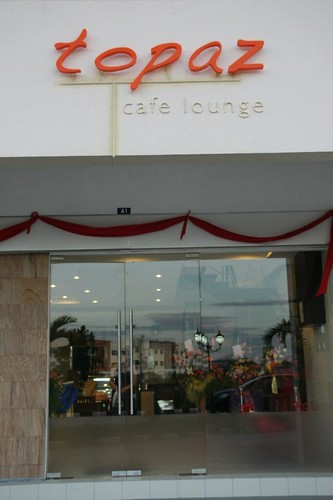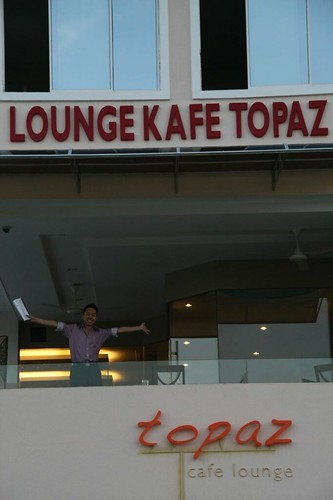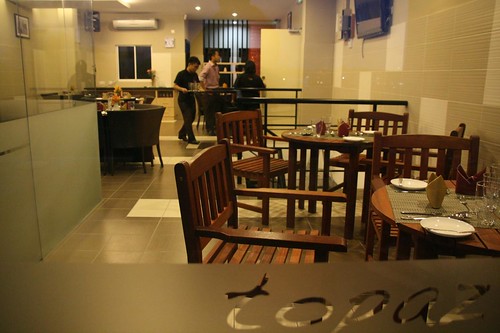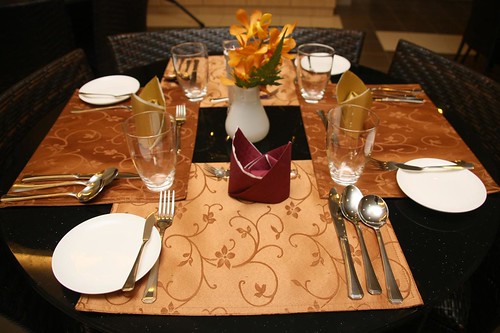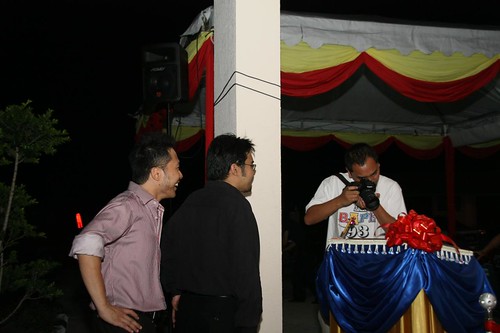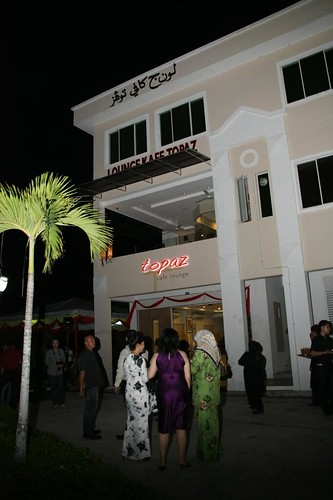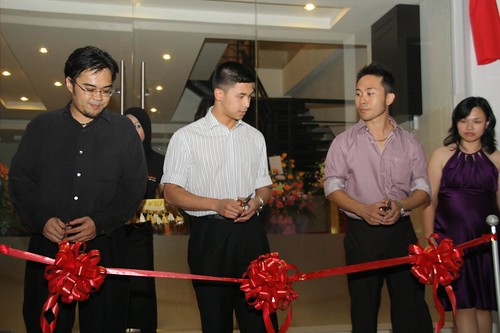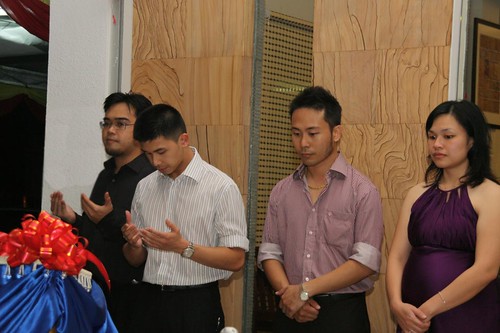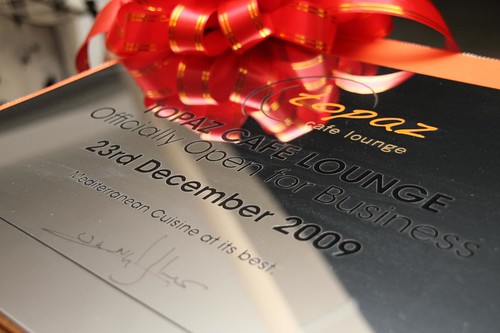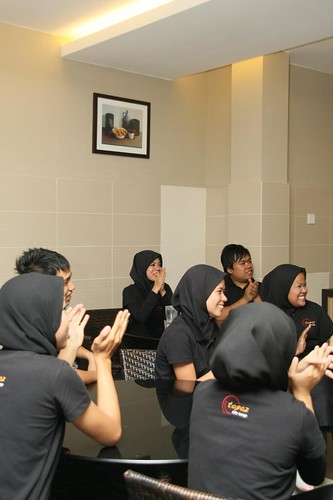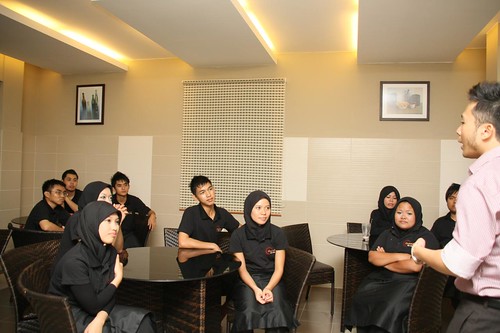As my best friend was part of the committee, I was asked to take some pictures on the last day of the event. Popping in between on-going workshops for a few snaps, I found myself fondly observing Linda Galbraith's workshop on Project Based Learning. The participants were engaged in fun-filled activities of English lessons, which made both the learning and teaching very enjoyable. I wished I was a student all over again!
I also enjoyed Gavin Cowley's presentation on 'Engaging Students – some questions!'. It was hilarious how he pointed out that we teachers ask so many questions, many of which are rhetoric or vague.
Here are the photos:

A participant asking question

Datin Paduka Dayang Apsah Hj Abdul Majid, Permanent Secretary (Core Education) of the Ministry of Education graced the conference with her presence.

Participants listening to the presentation
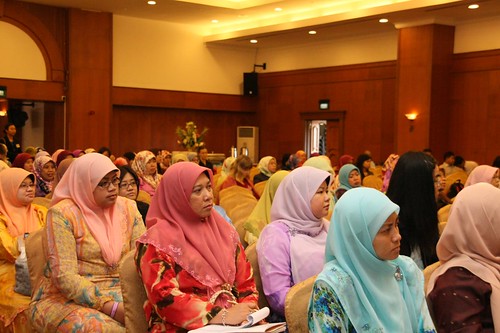
During Q & A session

Participants checking out the schedules and venues of the workshops

Ian David Stroughair

Ian David Stroughair running a workshop on "Using Models to Improve Students’ Writing"

Participants engaged in the activities

Linda Galbraith ran a workshop on "Project-based Learning"

Guessing emotions from facial drawings on the plates
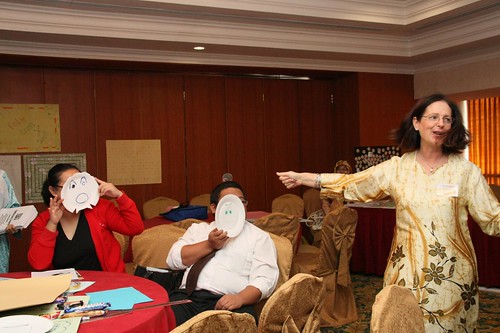
Making sentences with candy bars!

Another one with candy bars

Dr Supyan Hussin giving a talk on "Developing Blogs: New Dimension in Language Teacher Education"

Dr Greg Keaney was giving a talk on "What’s the point? Making language lessons memorable"

Gavin Cowley gave a talk on "Engaging Students – Some Questions!"

A participant working out activity sheet

Working in pairs

Some working in groups

Participants in another activity

Here are the brief descriptions of the presentations/workshops covered in the 3-day conference:
The Way Forward in Materials Development in ESL
Dr Hariharan N Krishnasamy
Similar to several countries in ASEAN that are attempting to improve the standard of English among the younger generation, the Malaysian government is identifying ways to support and promote the learning of English among schoolchildren. The English language curriculum for secondary schoolchildren has recognized the need for adapting the curriculum for developing appropriate materials so that low achievers in English are able to improve their English. The purpose of this study is to examine the relationship between the students’ cultural capital, the expectations in the secondary school English language classroom and material development to teach English. The present study reports on findings based on data collected through questionnaires and interviews in 2005 and 2006. A total of 205 students participated in the study. The views of teachers and administrators also provide additional information on curricular initiatives and material adaptation to facilitate English language learning, especially among low achievers in English. The overall pattern of results suggests that there is a lot of potential to develop and adapt materials for teaching secondary schoolchildren, but these are not without their attendant challenges. The paper concludes with insights on the importance of material development so that students are motivated to learn English.
A Basic Guide to Writing English Tests
Mark Butler
Putting together a good English test is a very complicated process: a testing framework needs to be established before any items are written, and the items themselves must be able to stand up to scrutiny. The presenter will describe the test-writing process at the Australian Council for Educational Research (ACER) and the implications this has for those intending to write their own tests. He will discuss the characteristics of a good test item and identify the problems with those items that are poorly written. He will draw upon his experience of writing the recent NSSCME Literacy tests for the Ministry of Education in Brunei.
Web-Based English Language Teaching in Malaysia: Preliminary Findings
Faizah Eliza Abdul Talib & Dr Supyan Hussin
The teaching of the English language in web-based environment is definitely not the same as the one in conventional setting. Unlike conventional setting which allows for face-to-face meetings between teachers and students, web-based language teaching limits the conversational interaction and nonverbal communication as there are certain constraints when teachers and students are online. In Malaysia, web-based language teaching is still new. Teachers and administrators are grappling to understand best practices in this field. A major inquiry in this research is to investigate the extent to which the concerned parties are ready to conduct web-based teaching online. Have teachers been trained with appropriate language pedagogy? Are they equipped with necessary technical knowledge and skills in order to teach language online? Are local universities ready with the infrastructure? Do administrators understand the needs of necessary items to ensure the success of language teaching in web environment? Are web-based language materials designed for web-based teaching adequate? These are some of the questions that require some answers that will implicate the policy making, training of human resource, allocation of funding, and teaching materials development. This paper will discuss preliminary findings on an empirical study carried out at universities in Malaysia. Data were collected using both qualitative and quantitative methods. The discussion of the findings will be based on four important aspects: teaching materials, delivery, teaching activities, and assessment.
Strange Language in a Foreign Land
Bridget Lim Suk Han and Abdul Rashid Mohamed
This paper is the story of a primary school in rustic Sabah, Malaysia. The school performance in public examination namely the UPSR (The Primary School Assessment Test) has been very poor particularly in the English language. The main question posed here is; how does this school function? The objective is not only to chronicle the development and evolution of the school but also to understand the spirit and character of this institution. This story is emancipated from a larger ethnography study which aims to gain an in-depth understanding of the processes and practices in rural schools. The data to construct the story are obtained from field notes, informal interviews and direct observations from the site. It is analysed at two levels; in the field and; interpretatively through triangulation of sources. It tries to narrate the story from the onset of the school, the characters involved and their struggles to educate the young children in a community that depends on the school not just for education. The school is perhaps the only formal institution and permanent structure in the community’s vicinity. The school is where the children get food, sometimes clothing too. It is also a place where some teachers and students find solace. It is much more than a school. Such dependencies naturally put more stress on the teacher’s resources and the resources of the school. To put in simply this is the story of a primary school in rustic Sabah, Malaysia.
Developing Blogs: New Dimension in Language Teacher Education
Dr Supyan Hussin, Norizan Abd Razak & Dalia S Qasim
Blog or weblog is now getting popular among language teachers in Malaysia. Earlier, a blog is used to record and share personal accounts, opinions, and beliefs, but now is seen useful for language teaching and learning (LTL) if it is used creatively. Like geocities.com site that is used to offer free space for web hosting in the past, wordpress.com, blogspot.com and a few others are now offering public to create their own contents. Hence, language teachers could take the opportunity to exploit this tool in the cyberspace to facilitate their teaching and learning. Studies on blogs in LTL are very few not only Malaysia but also in South-east Asia. This paper describes an action research on the development of blogs for LTL among post-graduate students, who are pre-service teachers and in-service teachers, at a local university in Malaysia. Findings from students’ responses to a survey and a set of open-ended questions on their personal experience will also be presented. The implications of the study will be discussed in relation to teacher training, materials design, and e-learning practice.
Project Based Learning
Linda Galbraith
Where to start? Take a text (written or visual) or a theme and begin. This workshop presents examples of project based learning and provides the opportunity for teachers to have a go at designing their own project based learning activities. It will present ideas and suggestions of how to approach project based learning to achieve language acquisition outcomes. Come and participate in project based learning and look at texts and themes that lend themselves to the possible tasks and activities you and your students can enjoy and explore. At the end of the session you will be more aware of what is involved and how you can implement project based learning in your classroom.
What’s The Point? Making Language Lessons Memorable
Dr Greg Keaney
Most language teachers follow schemes of work and graded learning activities that are based on theories of language learning that may or may not be true – yet their ‘real’ lesson planning involves thinking about tasks that students will find useful, enjoyable and memorable. This session focuses on simple methods and techniques to improve your language learning lessons. Come along and find out how to bring some joy and enthusiasm back into students’ language learning experiences. By the end of the session you’ll have obtained plenty of suggestions to help you brighten up your teaching. And, of course, you’ll have some fun too!
Using Models to Improve Students’ Writing
Ian David Stroughair
This workshop aims to examine some of the types of writing students in upper secondary education in Brunei are expected to produce in public examinations. From my experience, students often have little awareness of the different features of a range of writing genres. The first step for me is for teachers to write the kinds of responses to tasks that students are expected to write. This gives us a better insight into the different elements required (tense, time markers, vocabulary etc) of the different genres (descriptive composition, report, letter, speech etc). In this workshop I aim to show how using models can help students to understand the different components they need for specific genres. I hope to do this in a collaborative and active fashion. My hope is that the exposure to different writing genres can be a springboard to students writing with more confidence.
Curriculums of English Language Education: Approaches of Japanese Schools Overseas
Mitaka Yoneda
Japanese schools overseas, both primary and secondary, are designed for children who are living overseas to receive the same education as in schools in Japan. Their curriculums are created based on government guidelines for teaching in Japan. Amidst the current progression of internationalization, however, all Japanese primary schools overseas teach a foreign language and Japanese secondary schools have additional classes such as English conversation. Despite significant and positive efforts, their English language education is not very widely known.
The Japanese School in Singapore is one such Japanese school. After some transitions, they have made drastic changes to the current curriculum. They offer a different kind of English language education, including English immersion course for some subjects. The researcher had interviews with the teachers and other people related to the education, and observed some primary school classes. In this presentation, the methods of English language education being conducted in these Japanese schools in Singapore will be discussed in greater detail.
English Only? Inda Kali Eh! – Changing The Paradigm
Breda O’Hara-Davies
We live in an era of accelerated change and innovation which demands that we adapt and evolve or risk obsolescence and exclusion. This paper traces the path of English language teaching (ELT) since its inception. It examines some of the underlying theories that have guided its policies and practices at classroom level. It also questions whether ELT has kept pace with linguistic and other developments on a wider societal scale. Using an autoethnographic approach, the paper traces the parallel journey of the author in her role as an English language teacher in Brunei Darussalam. It aims at providing a reflexive account of the ways in which critical engagement with theory have impacted her attitudes, practices and ongoing evolution as a professional.
Revisiting Agreement Overtly
Jacqueline Sim & Shirley Su Chai Siik
In the midst of innovative approaches in teaching pedagogy looming ahead, can aged-old proven approaches in language teaching and learning such as overt teaching, which has been pivotal in language teaching and learning over the decades, entwine with the new approaches in maximising teaching and learning? This research aimed to examine the effectiveness of overt teaching of subject-verb agreement (SVA) amongst English as a Second Language (ESL) learners’ usage of SVA in writing. Learners find SVA challenging as this seemingly simple and basic grammatical form weaves itself into all forms of language use, but once mastered, the impact especially in the learners’ writing will be significant. This research which involved first year university students used pre-test and post-test essays to collect data on the learners’ usage of SVA in context. After the pre-test, treatment in the form of overt teaching using drills, explanations and written exercises of SVA was given and after which, the post-test was administered. The frequency of correct and incorrect construction of SVA forms in the pre-test essays was compared with the analysis of the learners’ usage of SVA in the post-test essays which revealed that the learners responded positively towards overt teaching as there were improvements in their usage of SVA. This is significant in creating headways in the learners overcoming their problems in using SVA besides ensuring there will be an uptake of SVA rules.
The Influence of Grammar Knowledge on Composition Writing Among Form 2 Students in Brunei Darussalam
Norhayati Haji Timbang @ Mohd Maidin
Accuracy in composition writing plays a vital role in the assessment of English composition writing among secondary students in the Brunei context. This paper attempts to explain the study conducted to investigate whether sixty Form 2 students who were grouped as high, medium and low ability were experiencing a “grammar gap” and the influence of these students’ grammatical knowledge on their narrative composition writing. Data collected was by means of a Cloze passage test and a picture narrative composition. The Cloze passage test tested the students’ grammatical knowledge of grammar points covered in narrative texts and the picture composition required the students to write a composition of about 100 to 150 words long. Errors committed by the students in the Cloze passage and in their written compositions were linguistically categorized, the relative frequency of each linguistic category was calculated. Pearson-correlation was used to find out the relationship between the students’ grammatical knowledge and composition writing. It was found that there is a weak correlation between grammatical knowledge and composition writing. It is concluded that there is only a slight correlation (0.13) between grammatical knowledge (the independent variable) and narrative composition (the dependent variable). The study shows that the Form 2 students have little knowledge of English grammar. They do not seem to have internalized the rule systems and their errors have fossilized. In teaching, therefore, it is recommended that more attention should be devoted to input processing, noticing and awareness raising to help learners themselves discover or “uncover” the rules of the target language that will help them understand the language that they are learning.
Intercultural Adaptation Among International Students At The Tertiary Level
Dr Hariharan N Krishnasamy & Mohd Hafidz Hussein
The world of education is developing rapidly to meet the increasing demands of students, especially those from the developing world. A sizeable proportion of students from developing nations are looking beyond their national boundaries to gain knowledge and skills in institutions overseas. This paper focuses on several aspects of intercultural adaptation when international students pursue their studies at a tertiary level Malaysian institution. The findings and discussions are based on a preliminary investigation conducted in 2009 with a group of 20 international students. These international students are from Asia. Qualitative methods were used to collect data over a period of three months. There are several ways international students adapt to their new academic environment, but they face a multitude of challenges. The paper suggests ways in which intercultural adaptation can help foster a more engaging relationship to enrich their learning experiences. One of the key areas of adaptation relate to language and communication. English plays a vital role in the communication process. In conclusion, pedagogical initiatives that assist in the process of intercultural adaptation are discussed.
Engaging Students – Some Questions!
Gavin Cowley
How many students have you got? How many would you describe as ‘engaging’? Are you an engaging teacher? To what extent is engagement your responsibility? What factors influence student engagement in Brunei? How can we improve on the quality of engagement? Can you determine the balance of focus for this paper from the above?
In his book ‘Outliers – the story of success’ Malcolm Gladwell identifies 10,000 hours as the key time-span for determining the mastery of any particular skill. Basically you are defined by what you spend your time doing. But what is it that we are asking our students to do, for the majority of the time they are sitting in our classes?
Most of us would have first met Bloom’s taxonomy when we did our initial teacher training, some of us may even have forgotten it. Bloom defined six levels of cognition in 1956, is this still relevant to the changing demands on our students in 2009? Are there some further questions we should be asking? In this paper, I will set out to examine how this taxonomy impacts on English Language teaching. How it fits with the teaching of other subjects and the aspirations of our students in Brunei. I also hope to share some practical ideas for adapting our methodology, so that our students are equipped with the skills required of them to succeed against the challenges and changes ahead, as they go forward into this new millennium.
Content and Language Integrated Learning (CLIL) Is This The Future Of English Language Teaching?
Stuart Pollard
There has been significant growth of CLIL (Content and Language Integrated Learning) on a worldwide stage in recent years. This paper is an introduction for those that have little or no knowledge in CLIL, and an extension or revision of prior knowledge for those with some background in the area. We shall look at what CLIL is, why the phenomenon is growing and what this means for language teaching. We shall then consider some of the benefits and challenges of working through a CLIL approach and think about how teachers and institutions will best be prepared to work in this way. We shall consider CLIL on Global, National, Regional and Institutional levels. As we consider different approaches to integrating language and content in the classroom, we shall build professional networks to support the development of teaching and learning through curriculum, professional development.
Is It Time for a Change in Paradigms? Investigating the Appropriateness of the Secondary School English Education System in Brunei Darussalam
Ak Hj Shaiffadzillah Pg Hj Omarali
Since the early 20th century, the teaching of English Language in Brunei Darussalam has always been challenging due to cultural aspects that associate with the contexts, processes and assessment materials being utilised. Furthermore, Standard British English, being an inherited measure of fluency as a result of Brunei being a former British protectorate, is beginning to lose its appeal owing to learners’ exposure to other forms of the English language. This paper investigates the appropriateness of adhering to these aforementioned learning standards by identifying the position of Brunei in Kachru’s Concentric Circle Model. This process revealed that Brunei’s speech fellowship is ‘norm-developing’ with an ESL Type II paradigm. These further revealed that fluency is achieved through endo-normative and exo-normative pathways, both depicting evidence of learning processes common in Brunei contexts such as the presence of interlanguage, codeswitching, acculturation and nativisation. The main proposition of these findings is the possible need for major changes in our approach to teaching the English language, and our expectations of what is considered ‘fluency’.
=================================
Look to past projects to plan for better ones
Ummi Othman
BANDAR SERI BEGAWAN
Friday, November 20, 2009
LEARNING from previous projects and taking positive and successful outcomes from these projects to implement new and better ones could lead to further enhancements in education, said Ministry of Education's (MoE) Acting Permanent Secretary (Higher Education).
Hj Suhaila Hj Karim gave this advice to the 200 participants of the third Biennial International Conference on Teaching and Learning of English in Asia (TLEiA) yesterday, comprising local and international English teachers, at the Orchid Garden Hotel.
The acting permanent secretary cited the Success at Cambridge 'O' Level Public Examination (Scope) and Sharing Practice of Effective Language Teaching (Spelt) projects, which were undertaken by CfBT (Centre for British Teachers) and MoE to improve the teaching and learning of English within secondary schools, as examples of successful projects that teachers could learn from.
Hj Suhaila also said that determining the threshold level of Brunei's pupils in the English language would help the ministry in introducing their English medium instruction subjects.
He added that with assistance from the ministry's consultant in Reading and Literacy, Dr Laura Huxford, who was also a keynote speaker at the conference, it is hoped that they would get an estimation on the threshold level mentioned.
Dr Huxford would also make a major contribution in the establishment of a proper reading programme in schools whereby each class level would be assigned with its own reading level in the future, he said.
This establishment would set the benchmark in English literacy for Bruneians, said the acting permanent secretary, adding that maximising benefits from such consultancy and other professional engagements could result in value for money services.
Datin Hjh Khadijah Hj Akbar, President of the Brunei English Language Teachers' Association (Belta), said in her speech that the conference aimed to provide Brunei teachers a forum to exchange views, discuss research and share experiences in English language teaching with Asian and international counterparts.
The TLEiA conference, themed "Embracing Change", ends its three-day programme today with a panel discussion among key participants of the conference.
The Brunei Times
==================================
Belta to hold conference on teaching and learning English
By Ignatius Stephen Nov 17th, 2009
The Borneo Bulletin
THE Brunei English Language Teachers’ Association (BELTA), together with Universiti Utara Malaysia (UUM), is to hold the Third International Conference on the Teaching and Learning of English in Asia (TLEiA Three) from November 18 to 20 at the Orchid Garden Hotel, in the Brunei capital.
The conference expects to attract presenters and participants from all over Asia and beyond, as it had in the previous two conferences.
At a time when national education systems are going through some of their most dramatic changes, a focus that seems to be universal is to keep teaching more up-to-date and as relevant as possible, an organising spokesperson said.
“As we near the end of the first decade in the new millennium, it is only apt to look back and reflect on the many changes the world of English Language Teaching and Learning the past nine years has brought us,” she added.
The conference, themed “Embracing Change”, aims to provide a comprehensive forum for academics and practitioners to exchange views and experiences on the changing educational landscape towards the continued development of an Asian perspective on English Language teaching and learning.
In particular, it will focus on important development issues relating to language theories and practices, teaching methodology, curriculum and materials development, assessment, Asian literature and ICT in English language education, language teachers’ education, and the internationalisation of curriculum and pedagogy.
The keynote speaker of the conference is Dr Laura Huxford from Oxford University, UK, who has a wide experience in curricular design. She will be illustrating the changes both the UK and Brunei education systems have and are currently undergoing.
She has been instrumental in our Ministry of Education’s drive towards improving literacy in Brunei’s primary schools, working very closely with our Curriculum Development Department (CDD) and Department of Schools.
Dr Robin Attfield, a CfBT guest speaker, will be presenting a plenary paper focusing on change within education and some of the wider changes that are happening world-wide in education, particularly the place of English in the curriculum; public private partnerships; staff development; accountability; use of data; learning and teaching; student voice and leadership.
Dr Attfield is an experienced educator who has taught in primary, secondary and special education. He held two headships before becoming a school improvement officer/ adviser-inspector in two authorities and was promoted to senior adviser-inspector in a large local authority.
He was Assistant Director at the National College for School Leadership where he was responsible for a number of programmes including the mandatory qualification for headteachers. He now works mostly for CfBT as a consultant working mostly on international assignments or research.
Dr Noor Azam Orang Kaya Maha Bijaya Haji Othman, Senior Lecturer in Professional Communications & Linguistics, and Deputy Dean of the Faculty of Arts & Social Sciences, Universiti Brunei Darussalam, will be presenting the second plenary paper entitled “Changing Linguistic Profile of Brunei: Notes for Language Education” in which he discusses the changing linguistic profile of Bruneians, the implications this recent development may have on language education in Brunei, and how we might embrace this change.
Dr Noor Azam was also Deputy Director of the Language Centre of UBD, where he was directly involved in the design and revision of ESP and EAP courses for the whole university, as well as other languages.
Driven by personal interest and his background as a speaker of ethnic languages, his favourite area of work remains the indigenous languages of Brunei and their place in this increasingly modernised nation.
In this regard, he is currently involved in several major research projects: one involving the documentation of the Tutong language and corpus building; creating a digital and an online interactive Tutong-Malay-English dictionary; as well as a study of Bruneian youth perceptions of Culture. He has published and written extensively about these language issues in both Malay and English. He is currently compiling and co-editing a book containing chapters written by young Bruneians on language in Brunei.
Registration for the conference is currently open at CfBT’s main office in Kiarong and will be open at Orchid Garden Hotel on Thursday, November 18, from 1pm to 4pm. For further information on the conference, email tleia3brunei@ gmail.com or visit the registration booth at Orchid Garden Hotel on November 18 at the times stated above.
The event is generously supported by the Sultan Haji Hassanal Bolkiah Foundation (Yayasan Sultan Haji Hassanal Bolkiah), with further support from the Ministry of Education, Orchid Garden Hotel, CfBT Education Services (B) Sdn Bhd, Macmillan Publishers UK, Darussalam Holdings Sdn Bhd, Brunei Tourism Board, Nyuk Lian Printing Sdn Bhd, Azamteknik Sdn Bhd, Lee Signcrafts Sdn Bhd and Syarikat Rapiah.
